Alida Valli, Rossano Brazzi and Fosco Giachetti were the stars of the Italian film Noi Vivi/We the Living (Goffredo Alessandrini, 1942). The film - in two parts - was one of the biggest box office hits in Italy during the Second World War. It was an adaptation of We the Living, the debut novel of the Russian-American novelist Ayn Rand, published in 1936. The anti-authoritarian film was soon banned by the Fascist government and pulled from theatres. More than forty years later, Rand found, restored and released the forgotten film. It received rave reviews.
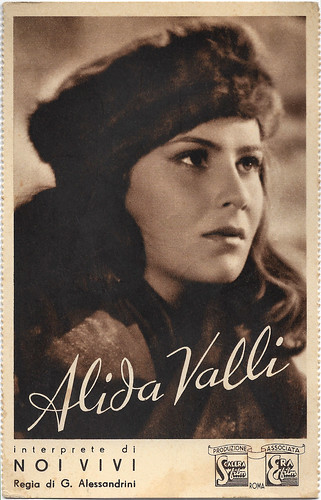
Alida Valli. Italian postcard by Zincografica, Firenze. Photo: Scalera Film / Era Film, Roma. Publicity still for Noi Vivi/We the Living (Goffredo Alessandrini, 1942).
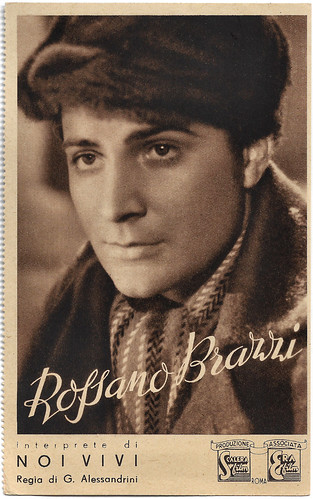
Rossano Brazzi. Italian postcard by Zincografica, Firenze. Sent by mail in 1942. Photo: Scalera Film / Era Film, Roma. Publicity still for Noi Vivi/We the Living (Goffredo Alessandrini, 1942).
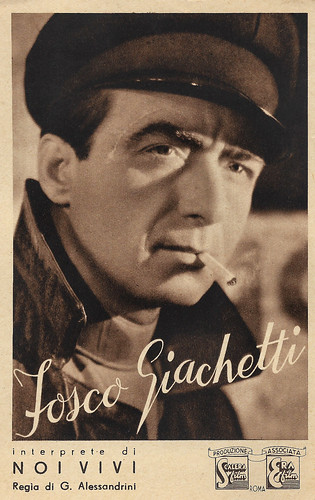
Fosco Giachetti. Italian postcard by Zincografica, Firenze. Photo: Scalera Film / Era Film, Roma. Publicity still for Noi Vivi/We the Living (Goffredo Alessandrini, 1942).
Ayn Rand's novel We the Living had been published in an Italian translation in 1937. When director Goffredo Alessandrini read the book, he immediately thought it would make an excellent screen epic. He never secured the film rights from Ayn Rand. Italy was at war with the United States and acquiring rights to the novel would be a major obstacle. The Fascist Ministry of Culture had set up special laws with regards to negotiations for rights and copyrights with enemy countries. So the film was made without the novelist's consent or knowledge, and no attempt was later made to compensate her.
Goffredo Alessandrini was a very successful director during Benito Mussolini's regime. His films are noted for their extreme realism, and have been lauded as anticipating the Neo-Realist movement that was to follow the end of the war. Taking advantage of the laisser-faire policy of the time, Alessandrini and his young associate director and screenwriter Anton Majano simply decided to use Rand's novel and base their screenplay on it.
They knew that We the Living touched on volatile political issues in Fascist Italy, but they hoped they would be safe from repercussions because of the story's negative portrayal of the Soviet Union, Italy's wartime enemy. It was approved for filming due to the intervention of dictator Benito Mussolini’s son Vittorio.
We the living is a tale of doomed love within a corrupt political world. In 1922, after the Soviet Revolution, 18-years old Kira Argounova (Alida Valli), the beautiful and smart daughter of impoverished traders, settles in St Petersburg to study engineering.
Kira rebuffs a cousin who rises in the Communist Party and may remember the slight. She has an affair with a mysterious young man, Leo Kovalenski (Rossano Brazzi), son of an executed czarist admiral. He gets into political trouble and flees. A fanatic student, Pavel Sjerov (Emilio Cigoli), denounces Kira to the police. Politic commissioner Andrei (Fosco Giachetti) falls in love with Kira during her arrest and tries to liberate her, raising suspicions.
Freed, Kira tries to flee abroad with Leo, but their boat is intercepted and sinks. They survive but Leo catches typhoid and needs to go to a sanatorium in Crimea. Kira goes to Andrei to ask for help and becomes Andrei's lover in return. But can Leo forgive her being Andrei's mistress?
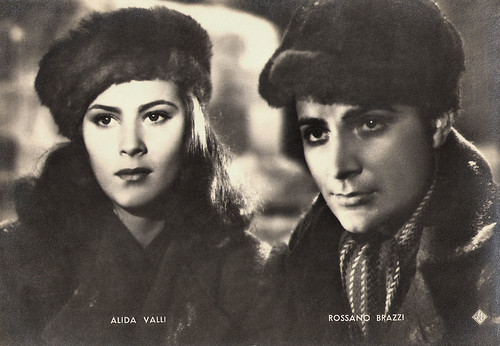
Italian postcard by ASER, no. 224. Photo: Pesce / Scalera Film. Publicity still for Noi Vivi/We the Living (Goffredo Alessandrini, 1942), with Alida Valli and Rossano Brazzi.
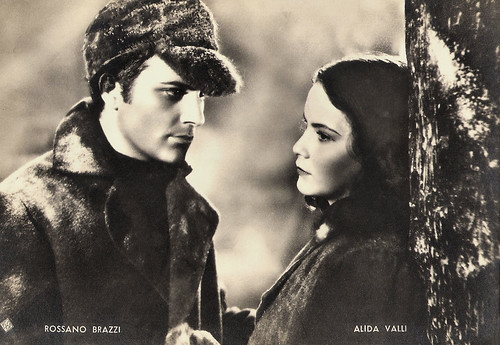
Italian postcard by ASER, no. 234. Photo: Pesce / Scalera Film. Publicity still for Noi Vivi/We the Living (Goffredo Alessandrini, 1942), with Rossano Brazzi and Alida Valli.
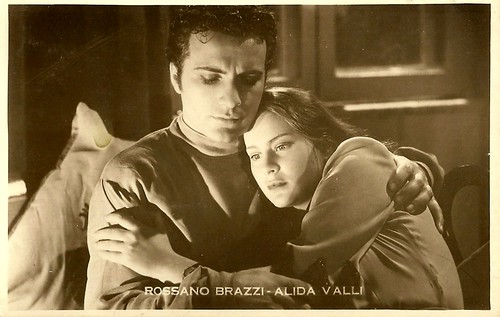
Italian postcard. Photo: publicity still for Noi Vivi/We the Living (Goffredo Alessandrini, 1942), with Rossano Brazzi and Alida Valli.
Goffredo Alessandrini and screenwriter Anton Majano went with the screenplay to Scalera Films in Rome. The production company asked several other writers to rewrite scenes and alter the dialogue from the existing screenplay. The final draft ended up being so different from the screenplay produced by Alessandrini and Majano that they both decided to start shooting without a script and just follow the book. The pair wrote scenes at night and handed them to the actors in the morning. The result is an adaptation that is more faithful to the novel than is typical in film adaptations of the time.
The film starred Alida Valli, already a major star in Italy, as Kira, top box-office attraction Fosco Giachetti as Andrei, and the incredible handsome Rossano Brazzi as Leo. Many of the extras were White Russian emigres living in Rome. The production designers were also born in Russia. The whole film, even its exteriors, were shot at the studio lot of Scalera. Though the films were little censored by the fascist government as the delicate scenes were not shown to the censors, they were still permitted as the story itself was set in Soviet Russia and was directly critical of that regime.
As weeks went by, it soon became clear to Alessandrini and Majano that it would take longer than the customary three weeks of shooting to finish this film. They also realised that there was enough material for two films, but they chose not to share this information with the actors for fear they would demand to be paid double.
In September 1942, after nearly five months of shooting, the film was completed and presented at the Venice Film Festival where it was awarded the Volpi Cup. The film had a lukewarm reception among the press. Critics thought it to be too dark, long, and talkative. It went on general release in November of the same year as two separate films, Noi Vivi/We the Living and Addio Kira!/Goodbye Kira!. Audiences loved it and turned it into a huge commercial success. This not in the least because of the - then controversial - portrayal of an intelligent, sexually independent heroine.
The Italian public realised that the two films were as much against communism as against the Mussolini regime. Though some pro-Fascist lines had been added to the film, the story is as much an indictment of Fascism as it is of Communism. The Italian newspapers began objecting to it and saying that it was anti-Fascist, which it was, essentially. The authorities got wind of this and the film was banned. Though the film should have been destroyed, Massimo Ferrara, the studio chief for Scalera Films, hid the negative and offered the authorities a negative of another film to be demolished.
After the war, Scalera Film approached Ayn Rand to secure the literary rights to the film(s) so it could be re-released but she refused. Though Rand liked and was impressed by the film(s), she highly resented the distortion of her message with the addition of a few pro-Fascist additions to the film adaptation. A few years later, Scalera Films went into receivership and as part of the inventory of Scalera, both Noi Vivi and Addio Kira! were turned over to a holding company. The company relegated them to a vault where they remained for over twenty-five years.
The film was lost and forgotten for decades, until the late 1960s when Ayn Rand was able to locate the original nitrate negatives, still in good condition in the vault in Rome. Both films were restored, combined into one, and released (with English subtitles) in 1986 as We the Living at the Telluride Film festival in Colorado. There the film received rave reviews, over 44 years after its original release.
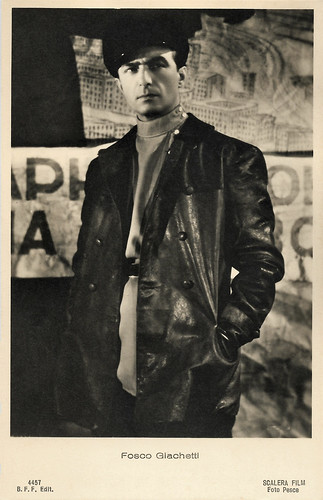
Italian postcard by B.F.F. Edit., no. 224. Photo: Pesce / Scalera Film. Publicity still for Noi Vivi/We the Living (Goffredo Alessandrini, 1942) with Fosco Giachetti.
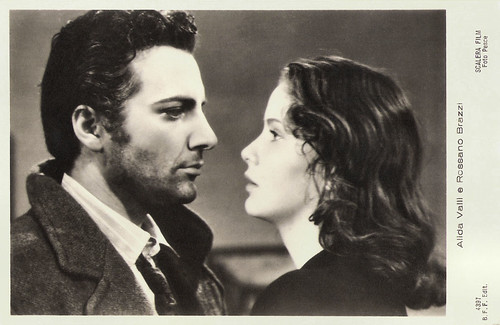
Italian postcard by Casa Editrice Ballerini & Fratini, Firenze (B.F.F. Edit.), no. 4397. Photo: Pesce / Scalera Film. Publicity still for Noi Vivi/We the Living (Goffredo Alessandrini, 1942), with Rossano Brazzi and Alida Valli
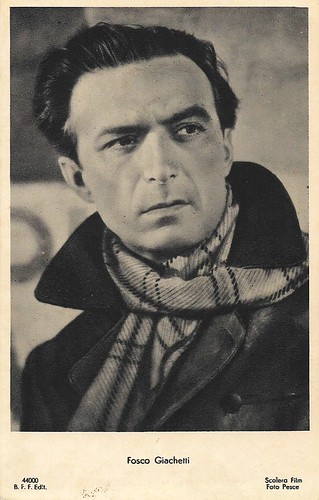
Italian postcard by B.F.F. Edit., no. 4400. Photo: Pesce / Scalera Film. Publicity still for Noi Vivi/We the Living (Goffredo Alessandrini, 1942) with Fosco Giachetti.
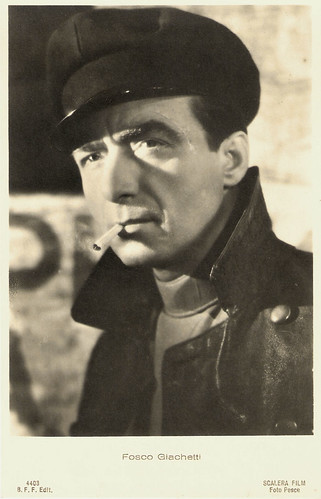
Italian postcard by B.F.F. Edit., no. 4423. Photo: Pesce / Scalera Film. Publicity still for Noi Vivi/We the Living (Goffredo Alessandrini, 1942) with Fosco Giachetti.
Sources: Wikipedia and IMDb.

Alida Valli. Italian postcard by Zincografica, Firenze. Photo: Scalera Film / Era Film, Roma. Publicity still for Noi Vivi/We the Living (Goffredo Alessandrini, 1942).

Rossano Brazzi. Italian postcard by Zincografica, Firenze. Sent by mail in 1942. Photo: Scalera Film / Era Film, Roma. Publicity still for Noi Vivi/We the Living (Goffredo Alessandrini, 1942).

Fosco Giachetti. Italian postcard by Zincografica, Firenze. Photo: Scalera Film / Era Film, Roma. Publicity still for Noi Vivi/We the Living (Goffredo Alessandrini, 1942).
A fanatic student denounces her to the police
Ayn Rand's novel We the Living had been published in an Italian translation in 1937. When director Goffredo Alessandrini read the book, he immediately thought it would make an excellent screen epic. He never secured the film rights from Ayn Rand. Italy was at war with the United States and acquiring rights to the novel would be a major obstacle. The Fascist Ministry of Culture had set up special laws with regards to negotiations for rights and copyrights with enemy countries. So the film was made without the novelist's consent or knowledge, and no attempt was later made to compensate her.
Goffredo Alessandrini was a very successful director during Benito Mussolini's regime. His films are noted for their extreme realism, and have been lauded as anticipating the Neo-Realist movement that was to follow the end of the war. Taking advantage of the laisser-faire policy of the time, Alessandrini and his young associate director and screenwriter Anton Majano simply decided to use Rand's novel and base their screenplay on it.
They knew that We the Living touched on volatile political issues in Fascist Italy, but they hoped they would be safe from repercussions because of the story's negative portrayal of the Soviet Union, Italy's wartime enemy. It was approved for filming due to the intervention of dictator Benito Mussolini’s son Vittorio.
We the living is a tale of doomed love within a corrupt political world. In 1922, after the Soviet Revolution, 18-years old Kira Argounova (Alida Valli), the beautiful and smart daughter of impoverished traders, settles in St Petersburg to study engineering.
Kira rebuffs a cousin who rises in the Communist Party and may remember the slight. She has an affair with a mysterious young man, Leo Kovalenski (Rossano Brazzi), son of an executed czarist admiral. He gets into political trouble and flees. A fanatic student, Pavel Sjerov (Emilio Cigoli), denounces Kira to the police. Politic commissioner Andrei (Fosco Giachetti) falls in love with Kira during her arrest and tries to liberate her, raising suspicions.
Freed, Kira tries to flee abroad with Leo, but their boat is intercepted and sinks. They survive but Leo catches typhoid and needs to go to a sanatorium in Crimea. Kira goes to Andrei to ask for help and becomes Andrei's lover in return. But can Leo forgive her being Andrei's mistress?

Italian postcard by ASER, no. 224. Photo: Pesce / Scalera Film. Publicity still for Noi Vivi/We the Living (Goffredo Alessandrini, 1942), with Alida Valli and Rossano Brazzi.

Italian postcard by ASER, no. 234. Photo: Pesce / Scalera Film. Publicity still for Noi Vivi/We the Living (Goffredo Alessandrini, 1942), with Rossano Brazzi and Alida Valli.

Italian postcard. Photo: publicity still for Noi Vivi/We the Living (Goffredo Alessandrini, 1942), with Rossano Brazzi and Alida Valli.
As much against fascism as against communism
Goffredo Alessandrini and screenwriter Anton Majano went with the screenplay to Scalera Films in Rome. The production company asked several other writers to rewrite scenes and alter the dialogue from the existing screenplay. The final draft ended up being so different from the screenplay produced by Alessandrini and Majano that they both decided to start shooting without a script and just follow the book. The pair wrote scenes at night and handed them to the actors in the morning. The result is an adaptation that is more faithful to the novel than is typical in film adaptations of the time.
The film starred Alida Valli, already a major star in Italy, as Kira, top box-office attraction Fosco Giachetti as Andrei, and the incredible handsome Rossano Brazzi as Leo. Many of the extras were White Russian emigres living in Rome. The production designers were also born in Russia. The whole film, even its exteriors, were shot at the studio lot of Scalera. Though the films were little censored by the fascist government as the delicate scenes were not shown to the censors, they were still permitted as the story itself was set in Soviet Russia and was directly critical of that regime.
As weeks went by, it soon became clear to Alessandrini and Majano that it would take longer than the customary three weeks of shooting to finish this film. They also realised that there was enough material for two films, but they chose not to share this information with the actors for fear they would demand to be paid double.
In September 1942, after nearly five months of shooting, the film was completed and presented at the Venice Film Festival where it was awarded the Volpi Cup. The film had a lukewarm reception among the press. Critics thought it to be too dark, long, and talkative. It went on general release in November of the same year as two separate films, Noi Vivi/We the Living and Addio Kira!/Goodbye Kira!. Audiences loved it and turned it into a huge commercial success. This not in the least because of the - then controversial - portrayal of an intelligent, sexually independent heroine.
The Italian public realised that the two films were as much against communism as against the Mussolini regime. Though some pro-Fascist lines had been added to the film, the story is as much an indictment of Fascism as it is of Communism. The Italian newspapers began objecting to it and saying that it was anti-Fascist, which it was, essentially. The authorities got wind of this and the film was banned. Though the film should have been destroyed, Massimo Ferrara, the studio chief for Scalera Films, hid the negative and offered the authorities a negative of another film to be demolished.
After the war, Scalera Film approached Ayn Rand to secure the literary rights to the film(s) so it could be re-released but she refused. Though Rand liked and was impressed by the film(s), she highly resented the distortion of her message with the addition of a few pro-Fascist additions to the film adaptation. A few years later, Scalera Films went into receivership and as part of the inventory of Scalera, both Noi Vivi and Addio Kira! were turned over to a holding company. The company relegated them to a vault where they remained for over twenty-five years.
The film was lost and forgotten for decades, until the late 1960s when Ayn Rand was able to locate the original nitrate negatives, still in good condition in the vault in Rome. Both films were restored, combined into one, and released (with English subtitles) in 1986 as We the Living at the Telluride Film festival in Colorado. There the film received rave reviews, over 44 years after its original release.

Italian postcard by B.F.F. Edit., no. 224. Photo: Pesce / Scalera Film. Publicity still for Noi Vivi/We the Living (Goffredo Alessandrini, 1942) with Fosco Giachetti.

Italian postcard by Casa Editrice Ballerini & Fratini, Firenze (B.F.F. Edit.), no. 4397. Photo: Pesce / Scalera Film. Publicity still for Noi Vivi/We the Living (Goffredo Alessandrini, 1942), with Rossano Brazzi and Alida Valli

Italian postcard by B.F.F. Edit., no. 4400. Photo: Pesce / Scalera Film. Publicity still for Noi Vivi/We the Living (Goffredo Alessandrini, 1942) with Fosco Giachetti.

Italian postcard by B.F.F. Edit., no. 4423. Photo: Pesce / Scalera Film. Publicity still for Noi Vivi/We the Living (Goffredo Alessandrini, 1942) with Fosco Giachetti.
Sources: Wikipedia and IMDb.
No comments:
Post a Comment